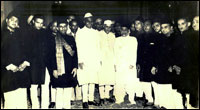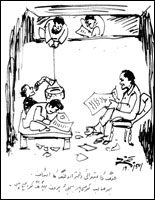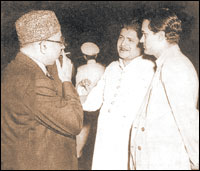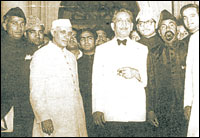Those
people are really very fortunate who are at the very onset of their
career in any profession; enjoy the patronage of the top intellects in their respective fields. In this perspective, I feel
I am highly honoured to have worked under the patronage of one of
the most eminent personalities of journalism, Mir Khalil-ur-Rahman.
Anybody who had the opportunity of meeting Mir Saheb even for a
few minutes, deemed it a great honour for himself.
intellects in their respective fields. In this perspective, I feel
I am highly honoured to have worked under the patronage of one of
the most eminent personalities of journalism, Mir Khalil-ur-Rahman.
Anybody who had the opportunity of meeting Mir Saheb even for a
few minutes, deemed it a great honour for himself.
When I joined Jang in the year 1986, as a shift-incharge I would
meet Mir Saheb at least once a day, often such meetings were not
pleasant. At six in the evening, a peon from Mir Saheb would call
Younus Riaz (News Editor), Nasir Chughtai (Dak Edition in-charge),
and myself (Local edition in-charge) for a meeting with Mir Sahib.
Entering his chamber, one could easily understand that Mir Sahib
had thoroughly scanned the contents of the newspaper while comparing
it with other newspapers.
At times he asked about a certain error in the paper and as to who
was responsible for the lapse, and what action was taken against
that particular person. Mir Saheb was very sensitive about any missing
news item and he was not prepared to accept any 'excuse' in this
respect. On certain occasions he did not hesitate to deliver a harsh
reprimand. But when he reprimanded in a harsh tone, he also knew
how to compensate, because he was well aware that if his workers
had to work with any tension or bitterness in their minds, and did
not have any peace of mind, they were open to making more mistakes
with perturbed minds, in the issues of the newspaper coming on the
next day. He knew fully well that the message, which he had intended
to convey, was well received and served the purpose. So in order
to bring the temperature down, he used to change the topic and mode
of his speech, and started speaking over some other light topics,
not necessarily related to the newspaper. On such occasions, he
provided more opportunities to the audience present before him to
express themselves and would listen to their remarks. At times when
he had scolded his workers to a great extent, he would invariably
offer them drinks like tea etc before ending the meeting.
Mir Saheb was fully cognizant of the fact that his workers required
to work with ease and without tension. Sometimes, when he had to
see any guest suddenly after he had scolded any staff he would ring
back, and speak in a way, which could eliminate the unpleasantness
in our minds.
Mir Saheb would educate us about the fine points, which are relevant
in connection with "headlines" or 'texts' of any news
item, and the one who heeded his fine points; surely could achieve
the zenith of his profession.
Speaking about the humility of Mir Saheb, suffice it to say that
no visitor who met him for the first time could have thought him
of being the owner of such a highly reputable newspaper. If anybody
came to him with any issue, he would very patiently hear him, and
then he would call the in-charge of the department concerned, and
tell him that the complainant was an important person and since
the in-charge did not know him, he should pay more attention to
the news sent by the complainant. However, if the complainant, while
taking the benefit of the situation, ever intervened to say something
directly to the in-charge, or started giving instructions to print
his news item in any preferential manner, Mir saheb would unhesitatingly
tell him not to interfere in the work of the in-charge, as it was
his sole prerogative to display any news item at any place he deemed
fit. Mir Saheb would also tell the complainant point-blank that
he himself never interfered as regards to the placement of any news
item. He would tell the complainant that the job was purely within
the jurisdiction of the in-charge. Mir saheb's action invariably
increased the prestige of the in-charge and discouraged others from
dictating his staff directly.
If someone wanted to see Mir Saheb, but he found him speaking over
the telephone, and stood waiting for him to get free after the phone
call was over Mir Saheb would ask him after finishing his telephonic
conversation or sometime during the conversation: "My dear
brother, why are you standing on my head. These chairs are kept
here for you to sit comfortably?"
Mir Saheb was also not very happy to be called repeatedly with the
word "Sir." He used to tell the caller that he was not
a school teacher who had to be addressed always with "Sir."
Looking back even to this day, about the life and manners of Mir
Saheb one has to admit what a great man he was and those who got
the opportunity to work with him were indeed very lucky. |

